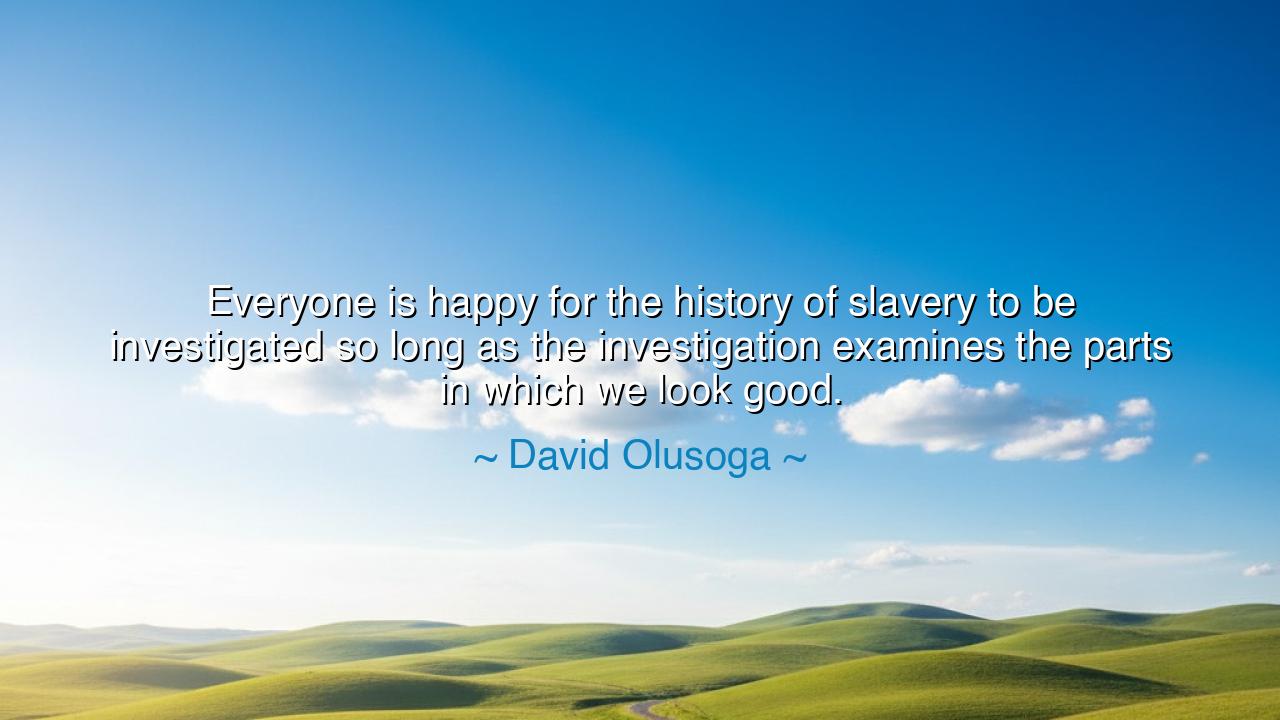
Everyone is happy for the history of slavery to be investigated
Everyone is happy for the history of slavery to be investigated so long as the investigation examines the parts in which we look good.






The words of David Olusoga — “Everyone is happy for the history of slavery to be investigated so long as the investigation examines the parts in which we look good.” — resound like a mirror held up to the conscience of nations. In this simple yet piercing truth, Olusoga exposes the human tendency to seek comfort in selective remembrance. His words are not an accusation alone, but a lament — that even when the past offers us the chance for wisdom, many prefer flattery over honesty. The quote reveals that history, though it should be a light for truth, is too often shaped into a shield against shame.
To understand the force of this statement, one must know the man who spoke it. David Olusoga, a historian and filmmaker of Nigerian and British heritage, has spent his life uncovering the buried layers of colonial history — particularly the story of slavery, whose legacy still courses through the modern world. In Britain, where he was raised, Olusoga found that history books spoke proudly of the empire’s abolition of slavery but seldom of its role in building that empire through the suffering of enslaved people. He observed that a nation eager to praise itself for ending injustice was reluctant to admit how deeply it had profited from it. Thus, his words arise from both scholarship and lived experience: a warning that truth without humility is no truth at all.
His insight reaches far beyond Britain or the history of slavery. It speaks to a universal weakness in the human spirit — the desire to edit memory. People and nations alike wish to see themselves as righteous protagonists, not flawed participants in cruelty. We glorify victory and downplay complicity. We speak of freedom but forget the chains that built our cities, the labor that filled our coffers. Selective remembrance becomes a balm that soothes the conscience while leaving the wound unhealed. Yet the wound remains, festering in silence until someone, like Olusoga, dares to name it.
History offers us many examples of this tension between pride and truth. Consider the aftermath of the American Civil War. For decades, the myth of the “Lost Cause” romanticized the Confederacy, portraying its leaders as noble defenders of heritage rather than protectors of slavery. Monuments were raised, songs were written, and the truth was buried under marble and myth. Only generations later did historians and citizens begin to confront the darker reality: that progress cannot be built upon denial. So it is everywhere — in every nation that has exploited others, in every people who would rather remember their heroism than their cruelty.
Olusoga’s words demand that we see history not as a tale of comfort, but as a mirror of responsibility. For to confront our past honestly is not an act of shame, but of strength. The ancients knew this well: the philosopher Thucydides wrote that history was meant to teach future generations, not entertain them. He called it a possession for all time — a tool for understanding the cycles of human error. But when a people refuse to see their own reflection clearly, they are doomed to repeat the same sins in new forms. The unwillingness to face the past with courage becomes a chain as binding as any iron shackle.
Yet there is hope within this confrontation. When truth is embraced, even when it burns, it becomes a cleansing fire. Nations that dare to tell their full stories — of both greatness and guilt — emerge stronger, wiser, and more just. South Africa’s Truth and Reconciliation Commission stands as a testament to this principle. By allowing victims and perpetrators alike to speak openly of the crimes of apartheid, the nation began the slow work of healing. The process was painful, but it proved that acknowledgment is the beginning of redemption. Olusoga’s plea is the same: to face what has been hidden, so that both the oppressed and the descendants of the oppressors may walk forward unburdened by silence.
So, my child, let this teaching echo in your heart: truth is not always flattering, but it is always freeing. Do not fear to examine the past — your own, your people’s, or your nation’s — in its entirety. For light cannot heal what darkness conceals. Remember that courage is not found in boasting of virtue, but in confessing failure. The history that matters most is not the one that makes us look good, but the one that teaches us to become better. And as Olusoga reminds us, the measure of a people’s greatness is not how proudly they celebrate their triumphs, but how honestly they confront their wrongs — and what they choose to do once the truth has been revealed.






AAdministratorAdministrator
Welcome, honored guests. Please leave a comment, we will respond soon